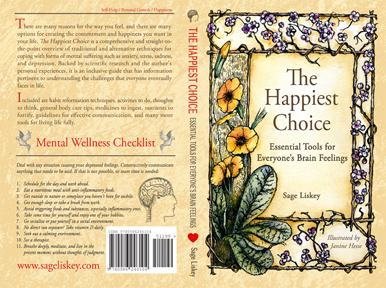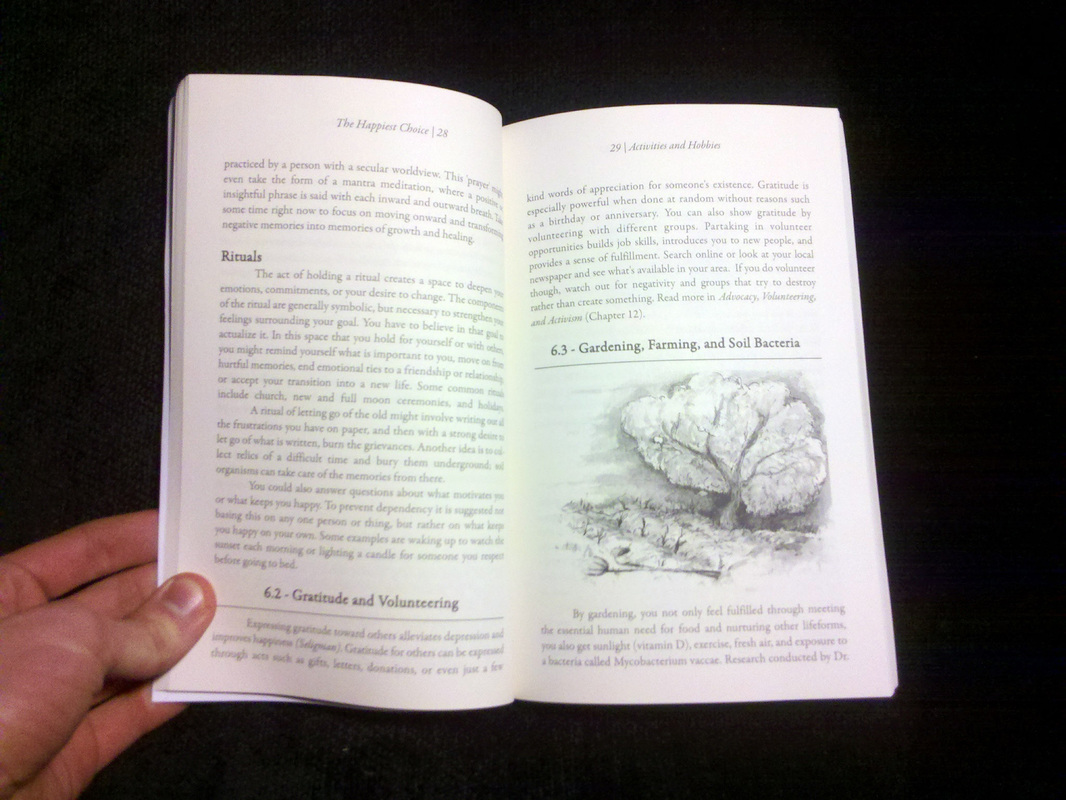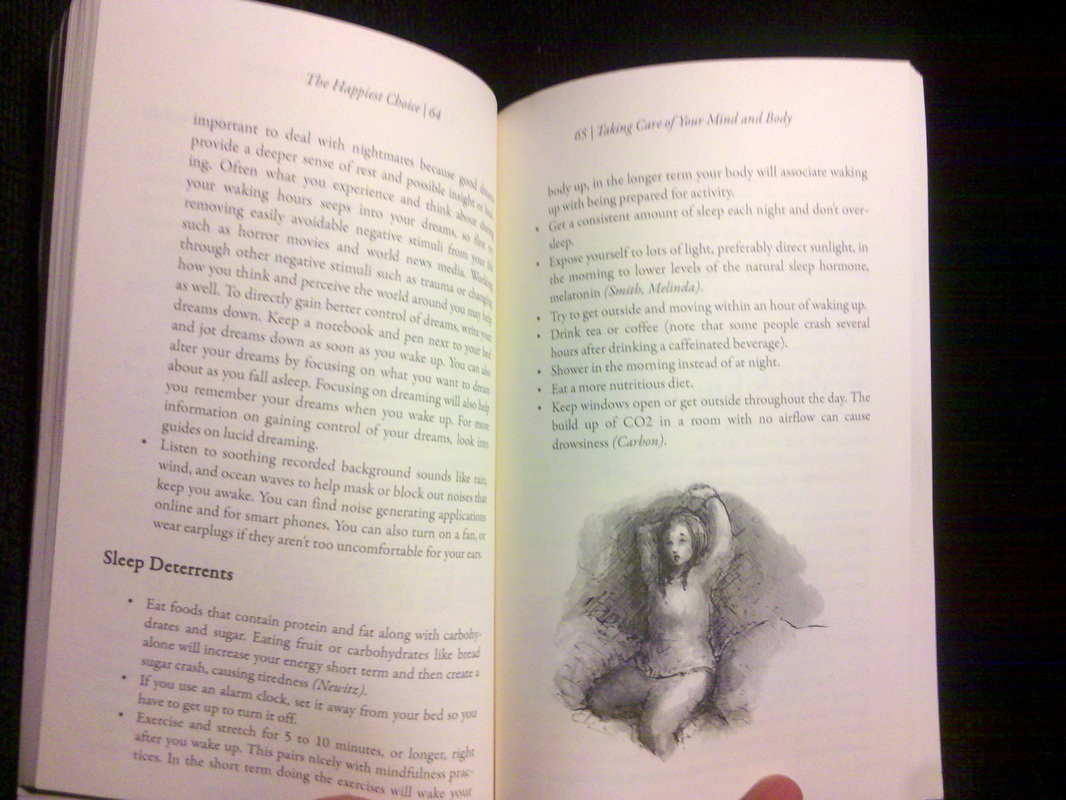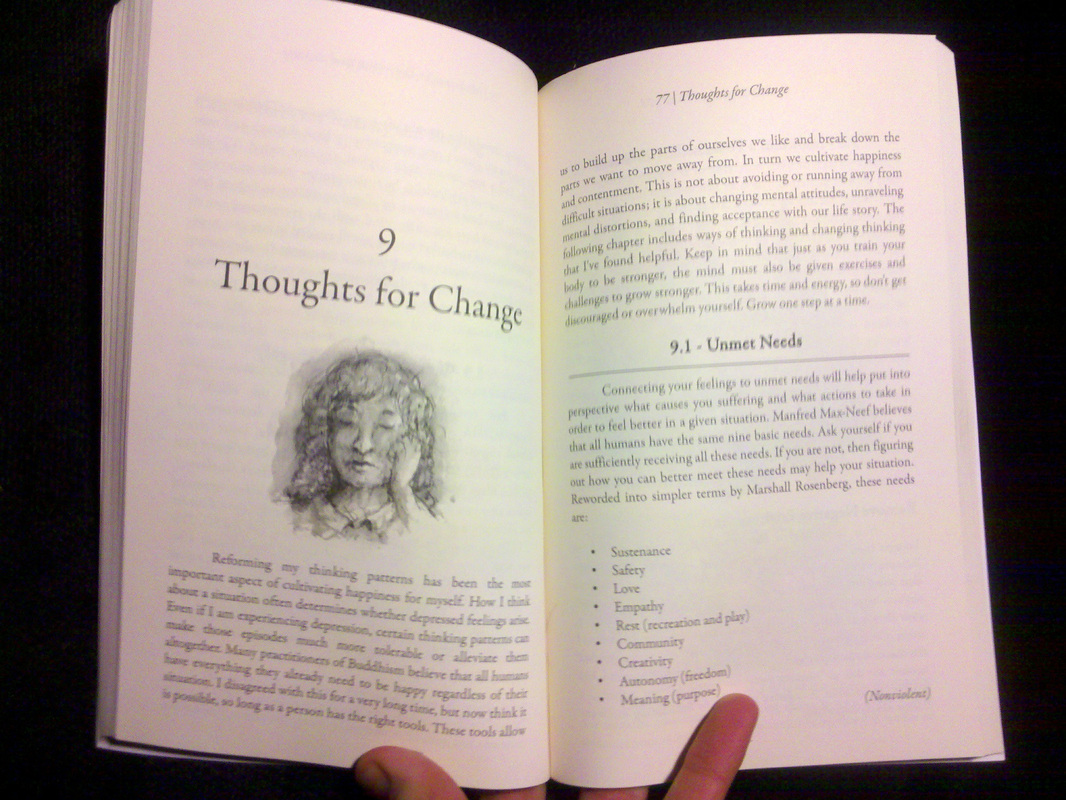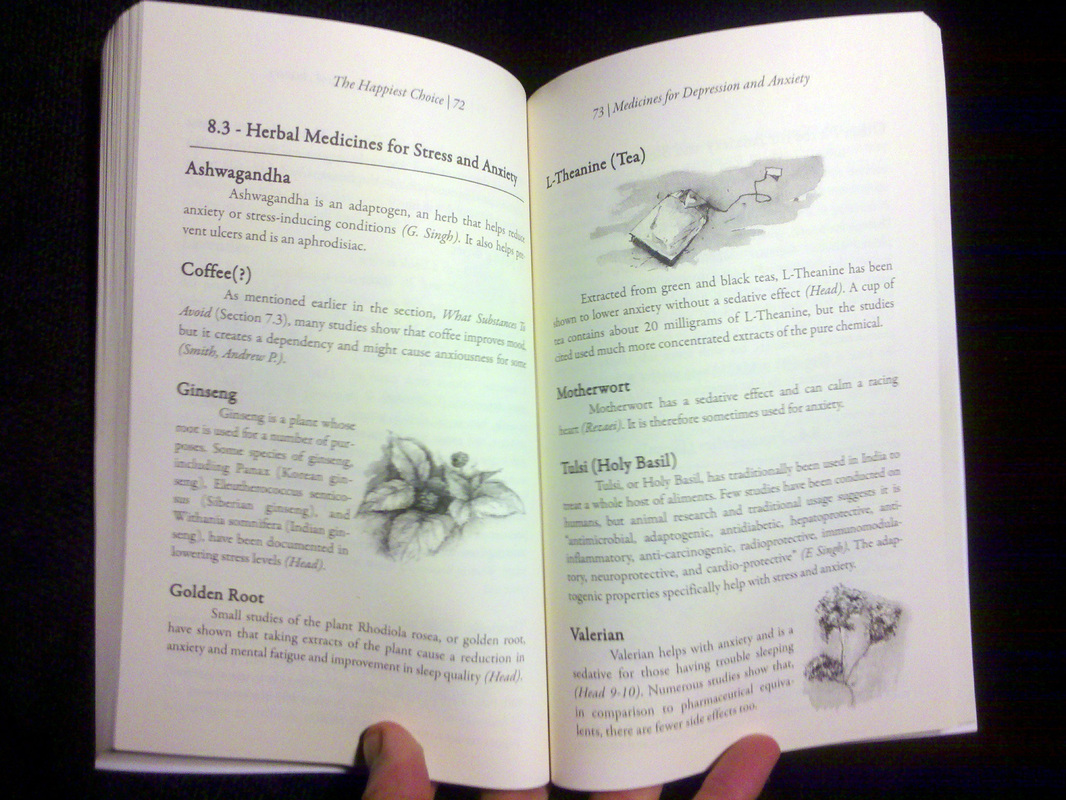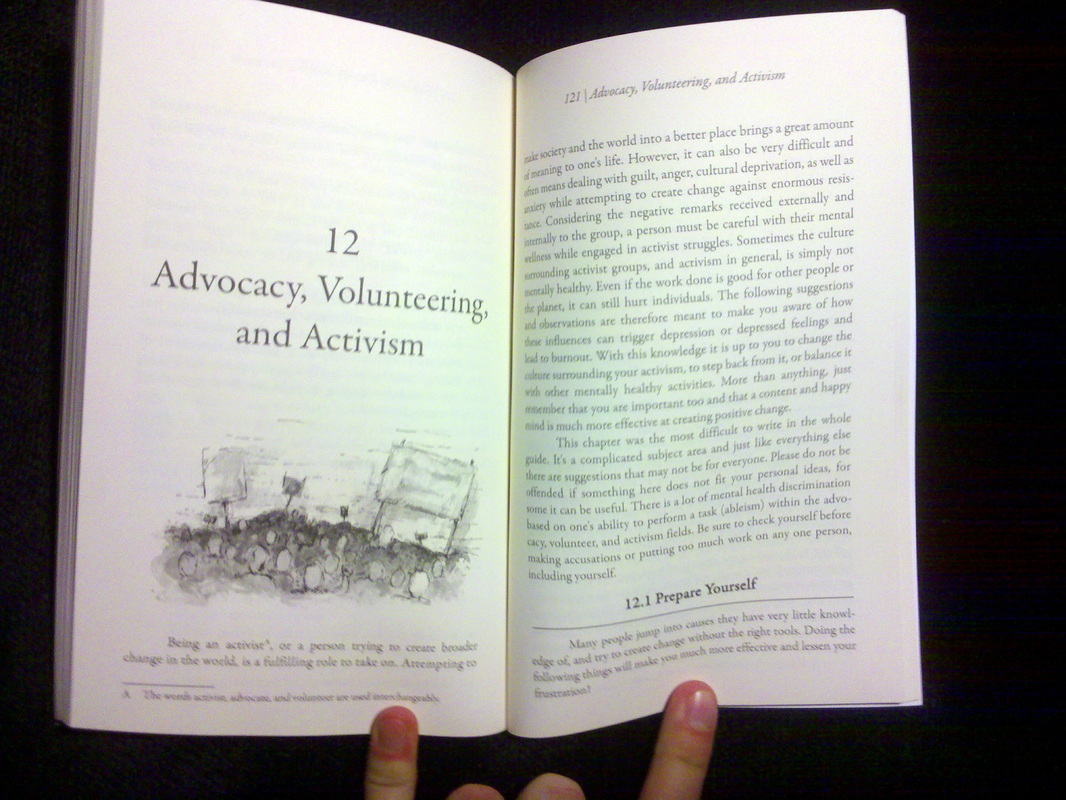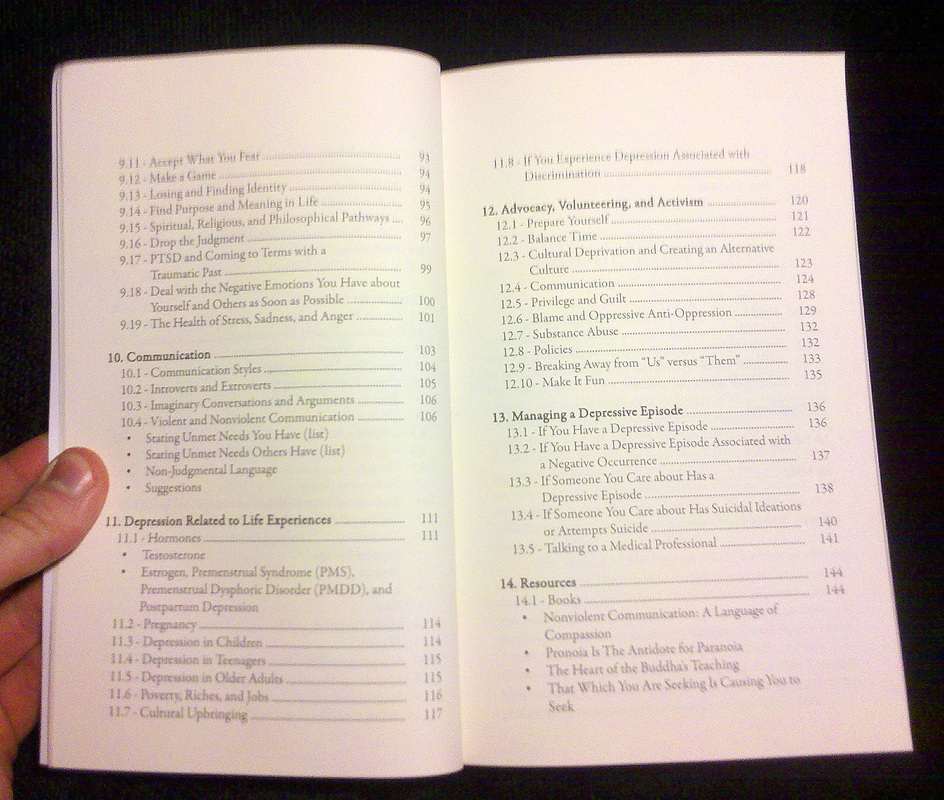The Happiest Choice:
Essential Tools for Everyone's Brain Feelings
Read the complete book by clicking the chapters below.
This free online version does not include illustrations. Buy a physical copy on my Etsy or Amazon.
Essential Tools for Everyone's Brain Feelings
Read the complete book by clicking the chapters below.
This free online version does not include illustrations. Buy a physical copy on my Etsy or Amazon.
[0. Table of Contents] [1. How to Use This Guide] [2. You Have Options] [3. What is Depression?] [4. What Causes Depression?] [5. The Road Map of Coping] [6. Activities and Hobbies] [7. Taking Care of Your Mind and Body] [8. Medicines for Depression and Anxiety] [9. Thoughts for Change] [10. Communication] [11. Depression Related to Life Experiences] [12. Advocacy, Volunteering, and Activism] [13. Managing a Depressive Episode] [14. Resources] [15. Conclusion] [16. Bibliography]
|
There are many reasons for the way you feel, and there are many options for creating the contentment and happiness you want in your life. The Happiest Choice is a comprehensive and straight-to-the-point overview of traditional and alternative techniques for coping with depression and depressed feelings backed by scientific research or the author's personal experiences. The book is an inclusive guide that has information pertinent to anyone from mothers and introverts to activists and marginalized groups of people.
Included are habit reformation techniques, activities to do, thoughts to think, general body care tips, medicines to ingest, guidelines for effective communication, and more. Whoever you are, you can be certain to find helpful and life-changing information for yourself, friends, and family. Download the free Condensed Edition here. Purchase the paperback version on Amazon here. Purchase the Kindle e-book version on Amazon here. Check out my other titles here or purchase them at Etsy. ______ Table of Contents
1. How to Use This Guide 2. You Have Options 3. What is Depression? 4. What Causes Depression? 5. The Road Map of Coping 5.1 - Desiring Change and a More Content Life 5.2 - Awareness of “Potentials” and “Triggers" 5.3 - Forming and Deforming Habits 5.4 - Action Plan 5.5 - Time for Self-Care and Scheduling 6. Activities and Hobbies 6.1 - Deep Breathing, Meditation, Mindfulness, Prayer, and Rituals 6.2 - Gratitude and Volunteering 6.3 - Gardening, Farming, and Soil Bacteria 6.4 - Writing 6.5 - Reading 6.6 - Make and Experience Arts and Crafts 6.7 - Listen to Music and Background Noise 6.8 - Go on Adventures 6.9 - Smile and Laugh 6.10 - Massage Therapy 6.11 - Acupuncture 6.12 - Light Therapy 6.13 - Calming Scents of Aromatherapy 6.14 - Friendships, Relationships, and Community 6.15 - Sex, Masturbation, and Pornography 6.16 - Celebrate Changes 7. Taking Care of Your Mind and Body 7.1 - Food 7.2 - Nutrients, Malabsorption, and Genetics 7.3 - What Substances to Avoid 7.4 - Sleeping and Awakening 7.5 - Physical Activity 8. Medicines for Depression and Anxiety 8.1 - Pharmaceuticals and Doctor Prescribed Drugs 8.2 - Herbal Medicines for Depression 8.3 - Herbal Medicines for Stress and Anxiety 8.4 - Psychedelics (Illegal) 8.5 - Ecstasy/MDMA (Illegal) 9. Thoughts for Change 9.1 - Unmet Needs 9.2 - Maintain a Positive Environment 9.3 - Collective Feelings 9.4 - Stop Workaholism and Take Time for Yourself 9.5 - Therapy 9.6 - Media Addiction and Staying in Tune with “Reality”. 9.7 - Acceptance of Who You Are 9.8 - Abundance Mentality and Fighting Regret 9.9 - Fix Distorted Beliefs 9.10 - Boost Confidence and Self Esteem 9.11 - Accept What You Fear 9.12 - Make a Game 9.13 - Losing and Finding Identity 9.14 - Find Purpose and Meaning in Life 9.15 - Spiritual, Religious, and Philosophical Pathways 9.16 - Drop the Judgment 9.17 - PTSD and Coming to Terms with a Traumatic Past 9.18 - Deal with the Negative Emotions You Have about Yourself and Others as Soon as Possible 9.19 - The Health of Stress, Sadness, and Anger 10. Communication 10.1 - Communication Styles 10.2 - Introverts and Extroverts 10.3 - Imaginary Conversations and Arguments 10.4 - Violent and Nonviolent Communication 11. Depression Related to Life Experiences 11.1 - Hormones 11.2 - Pregnancy 11.3 - Depression in Children 11.4 - Depression in Teenagers 11.5 - Depression in Older Adults 11.6 - Poverty, Riches, and Jobs 11.7 - Cultural Upbringing 11.8 - If You Experience Depression Associated with Discrimination 12. Advocacy, Volunteering, and Activism 12.1 - Prepare Yourself 12.2 - Balance Time 12.3 - Cultural Deprivation and Creating an Alternative Culture 12.4 - Communication 12.5 - Privilege and Guilt 12.6 - Blame and Oppressive Anti-Oppression 12.7 - Substance Abuse 12.8 - Policies 12.9 - Breaking Away from “Us” versus “Them” 12.10 - Make It Fun 13. Managing a Depressive Episode 13.1 - If You Have a Depressive Episode 13.2 - If You Have a Depressive Episode Associated with a Negative Occurrence 13.3 - If Someone You Care about Has a Depressive Episode 13.4 - If Someone You Care about Has Suicidal Ideations or Attempts Suicide 13.5 - Talking to a Medical Professional 14. Resources 14.1 - Books 14.2 - Online and Local Resources 15. Conclusion 16. Bibliography |
